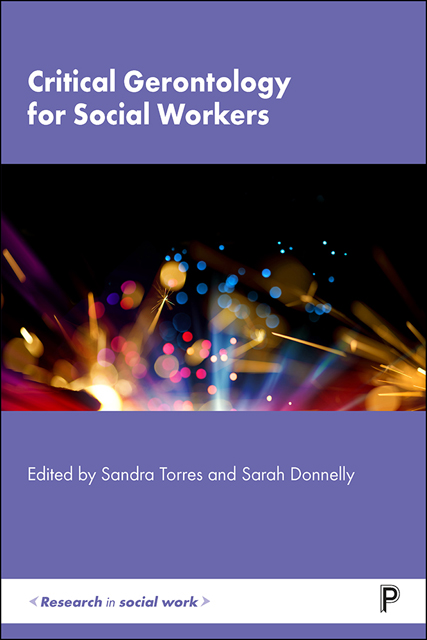Book contents
- Frontmatter
- Contents
- List of figures and tables
- Notes on contributors
- Acknowledgements
- Preface
- 1 Social work and critical gerontology: why the former needs the latter
- Part I Critical gerontology as guiding principles for social work with older people
- Part II Applying the critical gerontological lens to social work research, policy and practice
- Index
7 - Ethnicity, race and migrancy
Published online by Cambridge University Press: 13 October 2022
- Frontmatter
- Contents
- List of figures and tables
- Notes on contributors
- Acknowledgements
- Preface
- 1 Social work and critical gerontology: why the former needs the latter
- Part I Critical gerontology as guiding principles for social work with older people
- Part II Applying the critical gerontological lens to social work research, policy and practice
- Index
Summary
This chapter draws attention to three identification grounds that social workers are expected to consider and that policy makers see as a priority, that is, ethnicity, race and migrancy. One of the reasons why this is the case is that the globalisation of international migration is one of the greatest challenges many societies have been facing in recent decades (Torres and Lawrence, 2012; Lawrence and Torres, 2016; Torres and Karl, 2016). As a result of this, social workers must now address the challenges that increased diversity can pose. In the case of those who specialise in ageing and older people, referred to in this book as gerontological social workers, it is important to note that population ageing has also increased the number of older people who need eldercare services. Thus, gerontological social workers have to deal with both the challenges that population ageing poses and the ones that the globalisation of international migration presents. Their work is therefore impacted upon by two major societal trends that most societies are facing these days, which is why this book proposes that critical gerontology could offer a valuable tool to advance research and increase the user-friendliness of social work policy and practice as far as our ageing populations are concerned.
Gerontological social work practice needs to accommodate and respond to greater heterogeneity among older people and it is in this context that this book introduces the critical gerontology lens to social workers. This is, after all, a lens that is particularly helpful when one wants to engage in research, policy and/or practice in a heterogeneity-informed way. Thus, this chapter deals specifically with the source of heterogeneity that ethnicity, race and migrancy bring to the table, and does so because demographic data is clearly showing that ethnic, racial and migrant minorities are slowly but surely increasing in numbers across the world, with subsequent implications to population ageing. According to the Migration Data Portal (2021), there are, for example, 258 million international migrants in the world, and 11 per cent of them are 65+ years old. If one lowers the age threshold to 60+ – which is what the United Nations recommends when designing policy to address the needs of ageing populations – one can establish that 12 per cent of them are considered older migrants.
- Type
- Chapter
- Information
- Critical Gerontology for Social Workers , pp. 97 - 112Publisher: Bristol University PressPrint publication year: 2022



